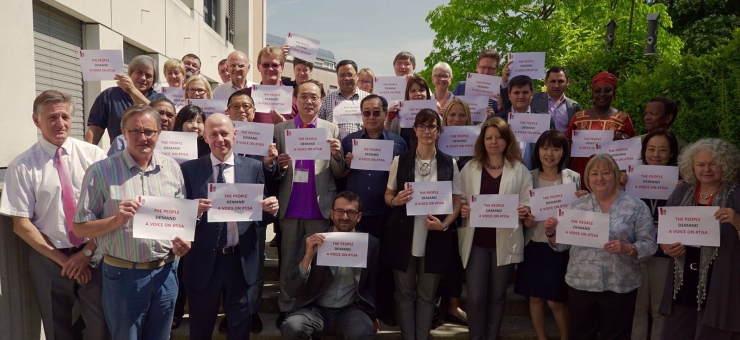News
Urgent call to governments for a democratic debate on TiSA

Philip Jennings, UNI Global Union General Secretary said: "The newly leaked documents on TiSA reveal once more than the trade rules are being written to benefit the top 1%. If adopted, TiSA would reduce the ability of governments to regulate to protect financial stability, labour rights and the environment. The TiSA talks strike at the heart of UNI Global Union membership and the services sector of the economy. We must blow open the secretive TiSA talks process.
Today, UNI Global Union and the union affiliates are urgently calling the governments of the countries involved in the TiSA negotiations to organize a democratic debate on the impacts of TiSA", added Philip Jennings.
"We must succeed, if not all our members including those from media, finance, ITC, commerce, property services and post and logistics will find a new world of regulation and globalization without regard to what this means for jobs and decent work", he concluded.
The TiSA negotiations are going ahead at an accelerating pace with most parties willing to finalize some of the key annexes on financial services, e-commerce and telecommunication. TiSA participants collectively represent 70 percent of the world's $44 trillion services marketplace and include: Australia, Canada, Chile, Colombia, Costa Rica, the European Union, Hong Kong, Iceland, Israel, Japan, Liechtenstein, Mauritius, Mexico, New Zealand, Norway, Pakistan, Panama, Peru, South Korea, Switzerland, Taiwan, Turkey and the U.S. Although the talks are often taking place at the WTO's headquarters in Geneva, they exist outside the organization's umbrella because not all member countries are included in the negotiations.
UNI Global Union has already expressed its concerns regarding the potential impacts of TiSA on democracy, transparency, financial regulation, labour rights and workers’ protection (in particular for migrant workers), data protection for consumers, environmental protection and access to universal public services. TiSA is a vehicle for corporate interests and multinational companies to maximize their profits and minimize their costs at the expense of social and environmental protection. Some of the countries involved also have a vested interest in reducing the space for public policy and regulation on new services.
UNI affiliates are being encouraged to contact their governments using the draft letter attached.
Additional background information from OWINFS (Our World Is Not for Sale) on the Wikileaks TiSA documents:
Wikileaks released the most updated draft texts on the proposed TISA on three new cross-cutting annexes: State-Owned Enterprises (SOEs); Professional Services, and New Provisions Applicable to All Services. The negotiating texts were supposed to remain secret for five years after the deal is finalized or abandoned, but with this publication, nearly every proposed annex has been released to the public, although none through official government channels. Updated texts on financial services, e-commerce, movement of natural persons (Mode 4), telecommunications, and transparency were also leaked.
The New Provisions annex would restrict the job-stimulating localization requirements that governments could place on foreign services providers. These proposals, which are more extreme than existing free trade/investment agreements, would make it harder for all TiSA countries to effectively regulate these companies - including potentially in the finance sector - and they would restrict developing countries’ ability to regulate foreign investment to promote development.
According to a brand-new analysis of the proposed annex on State Owned Enterprises by University of Auckland Law Professor Jane Kelsey, “the US proposal for state-owned enterprises in TISA adapts key parts of the Trans-Pacific Partnership Agreement chapter on SOEs as part of its strategy to create new global rules through the triumvirate of new mega-deals: TPPA, TISA and TTIP. The proposal would force majority-owned SOEs to operate like private sector businesses. It doesn’t directly require countries to privatise, but removes the rationale for them to remain public entities, creating conditions for privatisation by stealth.
The documents, along with the analysis, highlight the way that the TISA responds to major corporate lobbies’ desire to deregulate services, even beyond the existing World Trade Organization (WTO) rules. This leak exposes the corporate aim to use TISA to further limit the public interest regulatory capacity of democratically elected governments by imposing disciplines on domestic issues from government purchasing and immigration to licensing and certification standards for professionals and business operations, not to mention the regulatory process itself.
According to Politico: "The annex on domestic regulation would establish new grounds to challenge a country’s regulation if it is “more burdensome than necessary to ensure the quality of the service” — a rule included in other trade pacts, such as the World Trade Organization’s Agreement on Technical Barriers to Trade and not based on “objective and transparent” criteria related to a given service. In addition, the text specifies that regulations would have to be “impartial with respect to all applicants”.
"Similarly, the use of the word “impartial” could make it a violation for governments to show “partiality” to particular categories of applicants such as non-profits, small businesses and disadvantaged groups, the group says." These elements limit the nations' right to regulate and is a serious threat to democracy.

